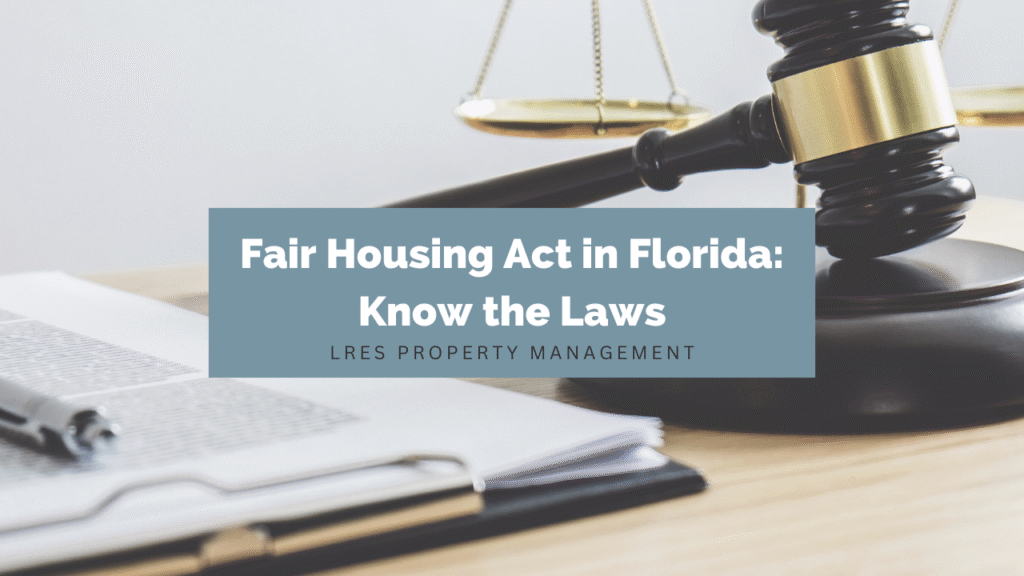Key Takeaways
- The Fair Housing Act (FHA) applies in Florida exactly as it does nationwide, but local ordinances in some cities and counties may add extra protections.
- Discrimination isn’t just about rejecting tenants—it can show up in ads, screening, lease terms, and disability accommodations.
- Staying compliant means consistency, documentation, and awareness, and working with a professional property manager can prevent costly mistakes.
Renting out property in Florida can feel like a balancing act. On one hand, you want reliable residents who care for your place. On the other hand, you must follow laws that protect people seeking housing.
One of the most important laws that protects your tenants is the Fair Housing Act (FHA). At its core, this law is about fairness. It makes sure every person has equal access to housing, and ignoring it can bring serious trouble.
In today’s blog, LRES Property Management will go over the dos and don’ts of Florida’s Fair Housing Act, so you can stay compliant.
GET A FREE RENTAL ANALYSIS
What the Fair Housing Act Does
The FHA , passed in 1968, is a federal law. It bans discrimination in housing nationwide. Think of the FHA as the baseline for how all owners and managers must treat applicants and residents.

Florida follows the same rules with no extra state-level categories added. However, some cities and counties, such as Miami-Dade, Broward, and Orlando, have local ordinances that expand the list of protected classes, so landlords should always check local rules as well.
Who Does the FHA Protect
The Act lists seven groups that get legal protection. That means you cannot deny housing, change terms, or treat someone differently because of their:
- Race
- Colour
- National origin
- Religion
- Sex (including sexual orientation and gender identity)
- Disability
- Familial status (having kids or being pregnant)
Here is a common example. A family with two children applies for your rental. You worry about noise and possible damage. You accept another applicant without kids, even though both meet your criteria. That choice could be considered discrimination under the FHA.
What Counts as Discrimination
It is not just about saying “no” to someone. Discrimination can appear in different parts of the rental process:
- Advertising: Writing “no kids” or “great for singles only” in your listing.
- Screening: Applying stricter income checks to one group of people.
- Lease terms: Charging higher deposits to certain applicants.
- Requests: Refusing to allow small disability-related changes, like a grab bar.
Sometimes owners cross the line without realising it. That is why awareness matters.
Florida’s Role
Florida sticks to the federal standards. There are no extra state protections. The law here is straightforward: follow the FHA.

The Florida Commission on Human Relations enforces these rules locally. Anyone who feels they faced housing discrimination can file a complaint with the state or with the U.S. Department of Housing and Urban Development.
How to Stay Compliant
So, what should you do as a property owner? Here are a few practical steps:
- Keep advertising neutral and focused on property features.
- Use the same screening process for every applicant.
- Document communications and keep a paper trail.
- Avoid exceptions—consistency is safer than gut instinct.
- Handle disability requests carefully and fairly.
Compliance is not about extra work—it is about protecting yourself from fines and lawsuits.
Mistakes Owners Often Make
Even good owners slip up sometimes. A few common errors:
- Asking if someone plans to have children.
- Refusing service animals because of “no pets” rules.
- Writing listings that sound restrictive without meaning to.
- Letting personal judgment override set criteria.
These small missteps can lead to big problems.
Why It Matters
You might think, “I treat everyone fairly already.” That is good, but even unintentional discrimination is still illegal. The penalties can include:
- Fines
- Legal expenses
- Loss of reputation
The U.S Department of Justice reports that discrimination complaints take months to settle and often cost thousands of dollars. That is not something most owners want to face.
What To Do If a Complaint Is Filed Against You
Even careful property owners can face complaints. If that happens, do not panic. Here are the steps to take:
- Respond quickly: Ignoring a notice will only make things worse.
- Gather documents: Keep applications, ads, and communications ready as proof.
- Stay professional: Avoid confrontations with the applicant or resident.
- Seek guidance: Work with a property manager or attorney for the right response.
HUD and the Florida Commission on Human Relations investigate complaints in detail. If you can show you applied fair rules and kept good records, you will have a stronger defence.
The key is preparation. Owners who stay organised and informed usually come out on top. To learn more about how to protect your investments, read our guide to Florida’s landlord-tenant laws.
The Role of Property Managers
This is where professional help makes a difference. Property managers handle the details with compliance in mind.

They know what language works in ads, what questions to avoid, and how to screen fairly. At LRES, we support owners across Florida with services designed to keep properties compliant and profitable. From advertising to resident communication, our team takes care of the rules so you can focus on your investment.
LEARN MORE ABOUT OUR TRUSTED TEAM
A Practical Example
Let us look at a real scenario. Two applicants apply for your unit. One has a service dog, the other does not. You say no to the applicant with the dog because your building has a “no pets” policy.
That refusal could be a violation, since service animals are not considered pets under the law. With a property manager handling applications, situations like this are avoided before they turn into a problem.
Advertising Done Right
Most owners get tripped up at the advertising stage. The safest route? Stick to the property itself.
- Describe the square footage, layout, and amenities.
- Mention location highlights, like schools or public transport.
- Post clear, up-to-date photos of the unit.
Avoid phrases that describe people. “Perfect for families” or “best for retirees” might seem harmless, but they can cause legal trouble.
Final Word
The Fair Housing Act in Florida is not complicated, but it is strict. It requires equal treatment for all applicants and residents, without exception.
The smartest move? Learn the basics, stay consistent, and consider professional support. With LRES Property Management, you gain a partner who understands both the law and the rental market.
Discover how we safeguard owners through comprehensive property management in Florida.
When you stay compliant, you protect your property, your income, and your peace of mind.
LEARN MORE ABOUT OUR TRUSTED TEAM
Disclaimer: Please note that the information provided in this blog is intended for general guidance and should not be considered as a replacement for professional legal advice. It is important to be aware that laws pertaining to property management may change, rendering this information outdated by the time you read it.

